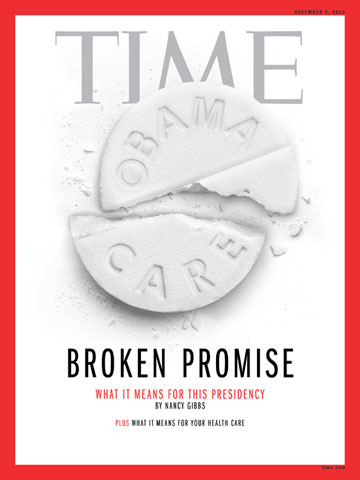
(4 of 6)
At the very least, a President has to run his most important initiative. As recently as Oct. 1, Obama vowed that shopping for health insurance would be as easy as comparing flights or flat-screen prices online. Then when it wasn't, the Administration explained that the program was just so popular, the site couldn't handle all that enthusiasm. Only too late did it become clear that no one with any experience launching a startup or managing the immensely complex task of integrating systems had ownership of the project. "The President has never surrounded himself with people who have deep experience in managing government, who really know how to make it work," observes Elaine Kamarck, a former Clinton adviser who now leads the Center for Effective Public Management at Brookings. "I don't agree with [James] Baker or Dick Cheney's politics, but they knew how to use the system to get things done. There's been no real equivalent in the Obama Administration."
So how could Obama not have known this? "I was not informed directly that the website would not be working the way it was supposed to," the President finally explained in his press conference. Had he known, he said, "I wouldn't be going out saying, 'Boy, this is going to be great.' I'm accused of a lot of things, but I don't think I'm stupid enough to go around saying this is going to be like shopping on Amazon or Travelocity a week before the website opens if I thought that it wasn't going to work."
But that answer just raised more profound questions. Everyone understands that a project of this size can face technical challenges. But what kind of White House leaves its boss that exposed? And what kind of boss lets that happen? By last summer, people should have been running around the West Wing with their hair on fire. In late March, consultants from McKinsey & Co. gave senior officials a 14-slide presentation detailing risks in the system, including indecision and a lack of adequate testing; the President was briefed on their recommendations. In April, Senate Finance Committee chairman Max Baucus warned that the Administration wasn't doing enough to explain and promote the new law. "I just tell ya, I just see a huge train wreck coming down," Baucus told Health and Human Services Secretary Kathleen Sebelius. In July, Henry Chao, deputy chief information officer of the Centers for Medicare and Medicaid Services, also worried that the website was going to be a disaster. "I just need to feel more confident they are not going to crash the plane at takeoff," he told a colleague in an internal memo. All the while, Obama's top aides said publicly and privately that they had the project in hand, managing it all with daily meetings from the West Wing. The White House's no-drama ethos had insulated Obama and his aides from reality.
Can He Fix It?
